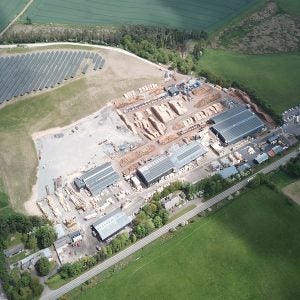Indonesia is celebrating being first out of the FLEGT licensing blocks with a shipment of about 12 containers organised by Apkindo (Indonesian Wood Panel Association) having arrived at Tilbury early in the New Year, comprising many licensed products, including door blanks and plywood. A further two were due in at Liverpool, while some other containers containing FLEGT-licensed machined timber arrived before Christmas, with Timber Connection receiving some dark red meranti, with yellow balau decking to follow later in January.
Eight other containers have also been delivered to Antwerp and Hamburg. Indonesian producers involved in the first shipment include Korindo Group, Kayu Lapis Indonesia Group, PT Kutai Timber Indonesia and PT Mujur Timber, while UK agents and importers taking part include Plaut International, Wood International Agency, James Latham, Falcon Panel Products, Timber Connection and Pacific Rim Wood Ltd.
Ambassador’s “pride”
Before Christmas the Indonesians were out in force at a Timber Trade Federation (TTF) organised event at London’s Building Centre to celebrate Indonesia’s achievement. “I am proud to be here, this is something to be celebrated,” said Indonesian ambassador to the UK Rizal Sukma.
“This is very important for not only Indonesia but also all the stakeholders. “We are here also to celebrate the fruit of our co-operation with the UK. The acceptance of our SVLK legality assurance system by the EU is one of the greatest achievements in UK-Indonesian co-operation.”
The SVLK, he explained, forms a central component of its Voluntary Partnership Agreement (VPA) under the EU Forest Law Enforcement, Governance and Trade (FLEGT) initiative. Once the VPA is fully implemented it authorises the signatory supplier to issue FLEGT licences.
“Overall it signifies our determination to fight illegal logging and protect the environment,” said Mr Sukma.
He said his country’s successful FLEGTlicensing of timber exports to the EU could be “the seeds for a global norm” in regulating and managing environmental challenges. It also demonstrated resolve to resisist growing scepticism about climate change. Mr Sukma added that Indonesia’s ministry of environment sincerely appreciated the support of the UK government and hoped it would continue. He also thanked all partners in the project, including Greenpeace and the Environmental Investigation Agency.
“We would not have been able to celebrate without all their support.”
Mr Sukma said he hoped the advent of FLEGT-licensed legal timber products would increase Indonesia export volumes to the UK and Europe.
“This needs to be supported from the demand side.”
He also said he wanted to see other timber exporting countries adopting FLEGT and by doing so contribute towards fighting climate change.
WWF congratulates trade
Julia Young, WWF’s Global Forest & Trade Network UK manager, congratulated Indonesia and also conveyed her appreciation to the UK timber trade for its interest in the whole FLEGT/timber legality agenda.
“It was very important that the VPA did not endorse weak processes, because there were serious challenges to be overcome. We have to be committed to having these dialogues and moving forward.
“At the WWF we still want people to be looking beyond legality to sustainable forest practices, but I think the VPA is key to that.” She said WWF wanted to continue working with the Indonesian government and resolve issues when they occur.
Andy Roby, FLEGT facilitator, said the successful delivery of FLEGT licensing in Indonesia was a great story to tell, with British investment in the FLEGT process starting back in 2001 and so far totalling about £40m.
UK support made difference
“It was the work of the UK trade that made a difference because it had stopped buying Indonesian timber because it thought it was too risky [from a legality perspective],” said Mr Roby.
“Now we have 100% legal Indonesian timber coming into this country. That message the trade sent to Indonesia to stop buying, because of the concerns, was a very powerful message.”
Mr Roby said Indonesia’s illegal logging rate had been as high as 70%. While this had not been eradicated, it had now been reduced.
“This is the first FLEGT-licence in the world and also the biggest in the world. So many countries are looking at this in Africa and Asia, including Cambodia, Vietnam and Myanmar.”
“I think Indonesia’s contribution to the tropical wood trade is about 30% in the world today.
“This shows the world that doing the right thing can pay dividends. Indonesia deserves to be the first in the world to achieve FLEGT.” David Hopkins, managing director of the Timber Trade Federation, said the first FLEGT-licensed timber importation was a “game-changer”.
“As the saying goes, ‘the forest that pays is the forest that stays.’ Now we can show that it works.”






